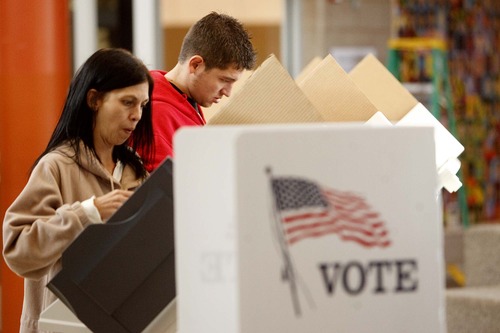This is an archived article that was published on sltrib.com in 2014, and information in the article may be outdated. It is provided only for personal research purposes and may not be reprinted.
Gov. Gary Herbert signed a bill Monday afternoon to overhaul Utah's nominating process and ending a push by the group Count My Vote to put a measure on the ballot to let voters get rid of the state's unique caucus-and-convention system.
Taylor Morgan, co-executive director for Count My Vote, said that, as promised, the group has shut down its ballot push in light of the governor's action.
"Our goal from the beginning has always been to change election policy," Morgan said. "Our initiative was a means to an end. … We're thrilled about it. This new process of a direct-primary path combined with opening those primaries to unaffiliated voters is a big win for Utah voters."
Under Utah's current system, delegates chosen at neighborhood caucuses meet at party conventions and typically choose the party's nominees for office. If fewer than 60 percent of the delegates support a nominee, the two top vote-getters go to a primary.
But Count My Vote had argued for years that caucuses exclude and disenfranchise the average voter, that the delegate system yields candidates who are outside the mainstream, and the caucus-convention system drives down voter turnout.
After asking the parties to change their system, organizers of the Count My Vote effort — including former Gov. Mike Leavitt; Gail Miller, president of the Larry Miller companies; and former first lady Norma Matheson — launched a drive to supplant the caucus system with direct primaries.
The group spent more than $1 million and gathered more than 100,000 signatures, appearing to be headed toward the ballot when Sen. Curt Bramble introduced SB54, which would have let political parties off the hook by allowing them to work around the Count My Vote language.
Count My Vote organizers reacted angrily, arguing Bramble was usurping the will of the people, but ultimately the two sides hammered out a compromise.
Bramble's bill leaves the caucus system in place, but candidates can also get to a party's primary ballot by gathering a set number of signatures.
Under the proposed framework, a candidate running for statewide office would need signatures from 28,000 voters to get on the primary ballot. A quarter of that number would be needed to run for one of the four congressional district seats. State Senate candidates would need 2,000 signatures and House candidates would need half that number.
Under SB54, parties would also have to allow unaffiliated voters to vote in the party primaries and allow absentee voting for delegates at its conventions.
Twitter: @RobertGehrke



